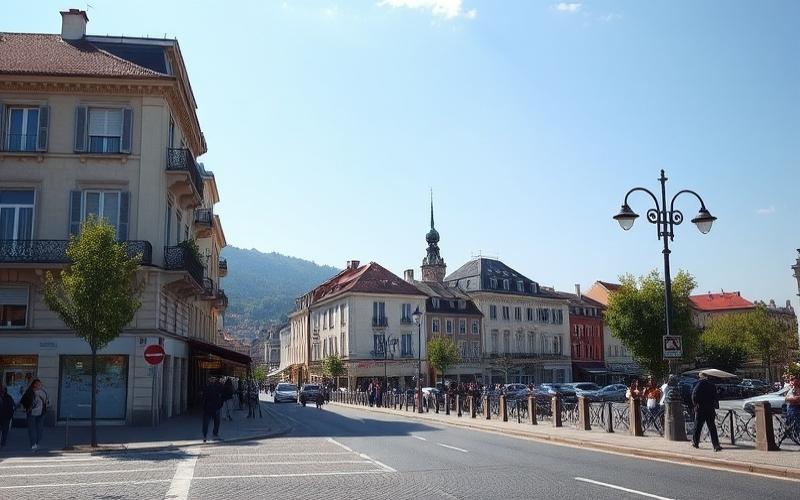
 Published on and written by Cyril Jarnias
Published on and written by Cyril Jarnias
In the heart of the Swiss Alps, a real estate phenomenon is emerging and disrupting traditional norms: the rise of co-living spaces. These shared living spaces, ingeniously combining the friendliness of a community and modern comfort, attract a diverse population, ranging from young professionals to retirees seeking new social interactions.
In a country where the demand for affordable housing continues to grow, co-living is positioning itself as an innovative solution to the challenges of the Swiss real estate market. The concept promises not only reduced costs but also a new way of living, where the values of sharing and sustainability come into their own.
The Rising Popularity of Co-living Spaces Among Young People in Switzerland
The Swiss real estate market is undergoing a transformation marked by the rise of co-living spaces, particularly in major cities like Zurich, Basel, and Geneva. Faced with constantly rising rents and a shortage of affordable housing, co-living appeals to a young audience seeking flexible and friendly alternatives. This lifestyle combines private housing (room or studio) and vast shared spaces (kitchen, living room, coworking), thus meeting the dual need for privacy and socialization.
Main Reasons Why Young Adults Are Adopting Co-living:
- High housing costs: sharing common spaces significantly reduces the monthly budget.
- Increased need for social contact: escaping urban isolation through a close-knit community.
- Contractual flexibility: shorter leases (one month to one year), facilitating professional or academic mobility.
- Taste for residential innovation: attraction to modern concepts integrating design, shared services, and sometimes community events.
Notable Examples of Swiss Spaces with Their Distinctive Offerings:
| Name | City | Unique Offering |
|---|---|---|
| Domo Le Flux | Basel | Latest opened space; encourages intergenerational exchanges |
| LivingTown | Zurich | Modern apartments + large common areas; oriented towards young professionals/students |
| Nest | Basel | Creative space fostering live/work environment; regular events |
Resident Testimonials:
“Co-living not only allowed me to reduce my expenses but also to feel quickly integrated into my new city. We share much more than just a roof – there’s real daily mutual support.”
“I especially appreciate the lease flexibility: I can easily move if my internship ends or if I have an opportunity elsewhere without administrative stress.”
Impact on the Traditional Rental Market:
- Increased rental turnover in cities
- Pressure on classic rents struggling to compete with the “all-inclusive” offer
- Diversification of real estate investors towards this promising segment
Outlook for Co-living in Switzerland:
The trend is set to intensify with:
- A growing demand among those under 35,
- Gradual integration into new real estate projects,
- Strong interest from international students and young professionals,
- Despite some regulatory challenges related to strict Swiss standards.
Co-living is thus establishing itself as a sustainable alternative to the current challenges of the Swiss real estate market while redefining the traditional codes of communal living.
Good to Know:
In Switzerland, co-living spaces are gaining popularity among young adults eager to overcome the high cost of living while seeking a dynamic and flexible social life. These trends are growing due to prohibitive rents and social isolation caused by traditional lifestyles. Notable examples in Switzerland include Home in Zurich and Kolegium in Lausanne, which offer modern shared spaces with services such as included cleaning, coworking spaces, and community events. Resident testimonials highlight the importance of social interaction in an environment otherwise accustomed to solitude. This progression also impacts the traditional rental market by putting pressure on landlords to innovate. In the future, the continued evolution of this lifestyle could durably transform the Swiss housing landscape, as developers turn towards more community-focused and sustainable projects.
The rising popularity of upscale shared housing in major Swiss cities is mainly explained by the combination of soaring real estate prices and evolving urban expectations. In 2024, the average price per square meter increased by 2.2% for apartments, reaching CHF 13,886/m² in Geneva and CHF 14,153/m² for houses, with a spectacular 141% increase over twenty-one years. This continuous appreciation makes access to individual housing increasingly difficult for young professionals and expatriates seeking centrality, comfort, and premium amenities.
- Increased supply of premium apartments (+20% on the market in early 2025)
- High rents in urban centers (up to €25/m² in immediate proximity)
- Enhanced attractiveness to a mobile international clientele
- Carefully designed common spaces (designer lounges, high-end equipped kitchens)
- Digitalized concierge service (package reception, daily logistical assistance)
- Regular organization of community events facilitating social integration
| Services Offered | Economic Benefits | Social Advantages |
|---|---|---|
| Fitness & spa areas | Shared cleaning costs | Quick creation of a local network |
| Integrated coworking | Reduction on subscriptions | Facilitated intercultural exchanges |
| Concierge service | Shared supply costs | Strengthened sense of belonging |
Economic benefits are significant thanks to sharing fixed costs (premium fiber optic internet, collective TV/streaming subscription), shared costs for cleaning, or the possibility of accessing equipment otherwise unaffordable individually.
For young professionals as well as expatriates arriving without an established local network, this type of shared housing offers a framework conducive to personal and professional development:
- Accelerated networking
- Quick integration into Swiss urban life
- Intellectual stimulation through cultural diversity
The continuous growth – +20% in premium supply in urban areas over the past two years – reflects a profound shift in the Swiss urban lifestyle: priority given to the overall residential experience rather than mere private ownership.
This phenomenon has a lasting impact on Zurich or Geneva, where it not only helps to ease the tight rental market but also strengthens international attractiveness through an offer adapted to contemporary demands.
Good to Know:
Upscale urban shared housing in Switzerland is gaining popularity thanks to the combination of luxury services and economic solutions adapted to current market trends. They particularly attract young professionals and expatriates looking to optimize their housing costs while benefiting from well-designed spaces, concierge service, and community events that facilitate networking. In 2023, a study showed a 15% increase in co-living offers, mainly in Zurich and Geneva, cities offering quick access to numerous services and professional opportunities. This urban lifestyle appeals due to its practicality, allowing residents to share not only rent costs but also services and supplies, while benefiting from an enriching and integrative social dynamic in an expensive housing context.
Shared spaces, whether coworking or coliving, are profoundly transforming daily and professional life in Switzerland. This model promotes resource sharing while adapting to evolving lifestyles and work methods.
Main Advantages
- Significant cost reduction: users benefit from professional equipment or residential spaces at a shared rate, thus limiting expenses associated with a classic individual lease.
- Increased flexibility: possibility to rent by the day or month according to needs, appealing to both freelancers and employees practicing hybrid remote work.
- Enhanced social dynamic: these spaces naturally encourage meeting, sharing, and mutual support among people from diverse backgrounds. This promotes quick integration into a new city or region.
- Reduction of real estate waste: no office or housing remains unused for several days.
Major Disadvantages
- Loss of privacy and feeling of depersonalization: the absence of a dedicated personal space can frustrate those needing quiet or wishing to personalize their environment.
- Noise management and sometimes difficult cohabitation: recurring ambient noise in open spaces, potential conflicts due to cultural differences or divergent habits among residents.
| Advantages | Disadvantages |
|---|---|
| Reduced costs | Loss of privacy |
| Access to modern infrastructure | Noise/difficult silence management |
| Increased sociability | Conflicts/cohabitation issues |
| Flexibility | Depersonalization |
New Collaborative Cultures in Switzerland
The rise of coworking has enabled the rapid development of a culture oriented towards open collaboration. Swiss companies find fertile ground to innovate without immediately committing their real estate resources long-term; this also facilitates spontaneous professional networking and the emergence of collective projects. In this context, we also observe a rise in coliving focused on conviviality – often designed with modular spaces mixing compact private housing (studios) and large common living rooms.
Swiss real estate innovates through:
- The creation of buildings entirely dedicated to coliving
- The systematic integration of shared services (connected multipurpose rooms, high-tech common kitchens)
“What I like here? It’s simple: I feel less isolated than in a classic apartment but I can still isolate myself when I need to.” — Testimony collected from a Geneva resident
“Meetings are constant; I even found my business partner thanks to the common living room.” — Lausanne user
Recent Growth Statistics
According to various sector studies conducted since 2022:
- The number of available spots in coworking spaces has increased annually between 12% and 18% in major Swiss cities
- The coliving market has shown growth exceeding 20% per year for the past three years
- Over a third of new urban real estate projects now include a “shared spaces” component
Implications for the Swiss Real Estate Market & Future Perspectives
The shared model durably disrupts the traditional offer:
- Net increase in mixed real estate projects including flexible offices/modular housing
- Relative – but not generalized – decrease in classic individual rents in some urban neighborhoods saturated by these new offers
- Regular appearance of “residential incubators” for young professionals/startups
In the medium term:
Industry players anticipate strong continued development due to growing appeal for rental flexibility, both among young graduates and some active seniors seeking more sociability without sacrificing autonomy.
The transition towards more “living together” now seems irreversible in several Swiss urban centers; it redefines not only our relationship with housing but also our daily ways… of working together.
Good to Know:
Co-living spaces in Switzerland have transformed daily and professional life by reducing housing costs by 10 to 30%, while increasing sociability, offering residents an environment conducive to enriching exchanges. This innovative form of housing fits into a new culture of collaborative work, particularly in major cities like Zurich or Geneva, where flexibility and sharing enhance professional creativity. However, the loss of privacy can be a drawback for some, although testimonials indicate that residents often adapt to an active community life. According to a recent study, the number of co-living spaces increased by 15% in Switzerland last year, reflecting growing demand and innovative adaptations in the local real estate market. These spaces are already influencing future real estate developments, with prospects including continued growth of the co-living model, prompting the sector to integrate more shared services to attract a diverse clientele.
Digital Communities: Fostering Social Connection and Innovation in Switzerland
Digital communities play a central role in the evolution of co-living in Switzerland, fostering both social connection and innovation. Digital technologies are transforming how residents interact, collaborate, and organize within these shared spaces.
Impact of Digital Technologies on Resident Interactions
- Digital platforms (mobile apps, internal forums, private groups) facilitate daily communication among members of the same space.
- They enable quick coordination of informal or formal meetings (collective happy hours, thematic workshops), thus strengthening the sense of belonging.
- Online collaborative tools help efficiently manage common resources: booking shared rooms, managing food supplies, or organizing collective cleaning.
Facilitation by Digital Platforms
| Functionality | Concrete Usage Examples |
|---|---|
| Event Organization | Creating and distributing invitations via Slack or WhatsApp |
| Resource Management | Shared boards for tracking materials/equipment |
| Collaborative Development | Platforms like Trello for managing common projects |
Examples of Swiss Start-ups or Projects Using These Digital Communities
- Several Swiss co-living projects actively integrate digital tools to enrich the residential experience:
- Local start-ups offer dedicated applications that centralize internal announcements, community calendar, and practical information.
- Some innovative Swiss spaces set up residential hackathons where each member can propose a digital idea improving communal life.
Role in Creating a Local Support Network & Social Innovation
- Digital communities create a dynamic social safety net: quick local mutual aid (occasional loans between neighbors), relay to external professional networks through shared contacts.
- This relational fabric also fosters the emergence of new social ideas: local incubators hosted in some spaces stimulate collective entrepreneurship and encourage sustainable or solidarity development at a local scale.
Key Takeaway:
Digitized co-living in Switzerland goes far beyond simple material sharing; it generates a collaborative dynamic where each member becomes an actor in communal living. The fluidity brought by digital tools allows not only better management but also genuine locally anchored social innovation.
Good to Know:
In Switzerland, digital communities play a key role in the rise of “co-living spaces” by stimulating social connection and innovation. Thanks to digital technologies, residents of these shared spaces can easily organize events via platforms like Meetup or Slack, thus strengthening the sense of community. Swiss start-ups such as Coliving.com use these tools to efficiently manage common resources, like coworking spaces and shared kitchens, and facilitate innovative collaborative projects. For example, the HubLausanne project brings residents together around sustainable and social projects, demonstrating how these digital communities foster the development of a local support network and social innovation throughout the country.
Disclaimer: The information provided on this website is for informational purposes only and does not constitute financial, legal, or professional advice. We encourage you to consult qualified experts before making any investment, real estate, or expatriation decisions. Although we strive to maintain up-to-date and accurate information, we do not guarantee the completeness, accuracy, or timeliness of the proposed content. As investment and expatriation involve risks, we disclaim any liability for potential losses or damages arising from the use of this site. Your use of this site confirms your acceptance of these terms and your understanding of the associated risks.

















































